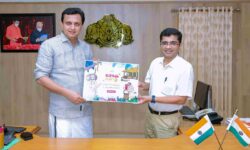
THIRUVANANTHAPURAM:
The quantification and characterization survey under the World Bank-aided Kerala Solid Waste Management Project (KSWMP) of the Local Self Government Department (LSGD) is progressing in full swing in Urban Local Bodies (ULBs) across the state.
The survey aims to assess the quantity and characteristics of the solid waste generated within the limits of each Municipality and Corporation in the state, to be leveraged as critical inputs in deciding the specific features and capacity of the waste management infrastructure required by each place.The survey has been completed 42 ULBs and is on in the remaining 51 ULBs.
All the sources of waste generation including households, hotels, institutions, railway stations, public utilities etc, will be covered by the survey, within a span of eight days in a civic body. Based on the quantification of the per capita generation of waste in the ULBs, separate Solid Waste Management (SWM) plans will be prepared to address the SWM needs of the ULB over the next 25 years.
Waste quantification and characterization helps identify various types and quantity of waste that needs to be managed, and the appropriate technologies and methods that can be used for treatment and disposal of various types of waste, options for waste reduction, reuse, recycling, and recovery.
Besides, waste quantification helps in estimating the cost and benefits of various SWM options and setting realistic targets and indicators for monitoring and evaluation. As per the Municipal Solid Waste Management Manual, waste quantification is one of the essential components of SWM planning and should be conducted before formulating the SWM plan for each ULB.
The data provided by waste quantification and characterization study will be leveraged for planning, designing and operation of waste management system most suitable to each ULB.
The study and SWM plans for the ULBs will have the advantages including creation of robust and sustainable SWM infrastructure; improving the efficiency and effectiveness of SWM services and infrastructure, enhancing the environmental and public health outcomes of SWM, reducing the greenhouse gas emissions and carbon footprint of SWM, promoting the participation and awareness of waste generators and stakeholders in SWM, and supporting the implementation of the Sustainable Development Goals (SDGs) as well as the initiatives of the Malinya Muktham Nava Keralam campaign.



